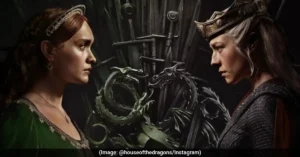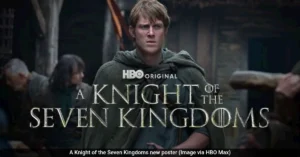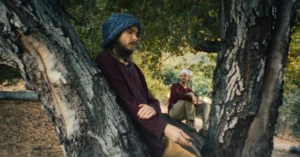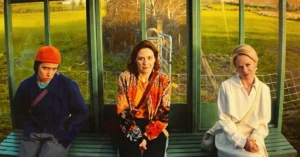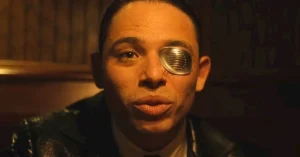Netflix’s When Life Gives You Tangerines has captured hearts worldwide with its touching tale of love, family, and resilience set on South Korea’s Jeju Island. Starring IU and Park Bo-gum, the drama blends everyday moments with profound themes. Beyond its emotional storytelling, the series hides subtle symbols that enrich its narrative. These details, often easy to miss, carry deep meaning about the characters and their journey. Here’s a closer look at five hidden symbols that make this K-drama unforgettable.
IU’s Beauty Mark Tells Two Stories
IU plays dual roles as Oh Ae-sun, a spirited young woman, and her daughter, Geum-myeong. A small but striking detail helps distinguish them: IU’s signature beauty mark. For Ae-sun, the mark—applied with makeup—appears on her face, reflecting her real-life persona and tying her to the character’s youthful rebellion. Geum-myeong, however, has no mark, showing her as a distinct person with her own path.
This choice wasn’t just practical. The beauty mark links Ae-sun across different actors portraying her at various ages, like Moon So-ri as the older Ae-sun. Each actor playing Ae-sun wears the mark, creating a thread of continuity. It’s a quiet nod to identity and how some traits endure through time, even as life changes people.
Haenyeo Tewag Honors a Real-Life Hero
In the first episode, a traditional tewag—a floating device used by Jeju’s haenyeo (female divers)—carries the name Hong Kyung Ja. This isn’t random. Hong Kyung Ja, born in 1950 on Jeju Island, inspired Ae-sun’s character. Like Ae-sun, she faced immense struggles, losing her mother at five and caring for eight siblings as a young haenyeo. Her life of sacrifice and strength mirrors the drama’s themes.
The tewag tribute grounds the story in reality. Hong Kyung Ja dove into the sea to support her family, just as Ae-sun’s mother, Gwang-rye (played by Yeom Hye-ran), dives despite a lung condition. This symbol connects the fictional world to Jeju’s fading haenyeo culture, where only 2,838 divers remained in 2023, down from over 14,000 in 1970.
Children’s Names Reflect a Father’s Love
Yang Gwan-sik (played by Park Bo-gum and later Park Hae-joon) names his three children with care: Geum-myeong (gold), Eun-myeong (silver), and Dong-myeong (bronze). These names aren’t just pretty—they tell a story. Gwan-sik, once a promising athlete, gave up his dreams to become a devoted husband and father. His children became his greatest achievements, like medals from a race he chose to run for them.
He even named his boat GeumEunDong, a heartfelt tribute to his kids. In Korean, Geum means gold, Eun means silver, and Dong means bronze, while Myeong adds brightness or tomorrow. Together, the names suggest a “golden tomorrow” or “bright future,” showing Gwan-sik’s hopes for his family. This symbol captures his quiet, unwavering love.
- Geum-myeong: Gold, bright tomorrow—his daughter, the first treasure.
- Eun-myeong: Silver, kind tomorrow—his eldest son, a gentle strength.
- Dong-myeong: Bronze, enduring tomorrow—his youngest, lost to the sea.
Sadly, Dong-myeong’s death in a storm reflects the ocean’s dangers, tying back to Jeju’s unpredictable nature. The boat’s name becomes bittersweet, holding both pride and grief.
Car Badge Charms Spark Mischief and Luck
Eun-myeong (played by Kang You-seok) stirs trouble in school by stealing letters from teachers’ car badges and selling them as lucky charms. Students believed a badge letter matching their dream university’s name—like an “S” for Seoul National University—would boost their chances. Later, Geum-myeong carries an “S” charm, possibly a gift from her brother.
This detail is playful yet meaningful. Geum-myeong does get into Seoul National University, hinting the charm “worked.” It shows sibling bonds—Eun-myeong’s mischief turning into support for his sister. It also reflects 1960s Korea, where superstitions mixed with ambition in a fast-changing society. The charm becomes a symbol of hope and cleverness amid hardship.
Hairpins Carry a Lifetime of Devotion
Gwan-sik’s love for Ae-sun shines through a simple gift: hairpins. As teens, he gives her one, a small gesture that grows into a lifelong promise. Over their marriage, he keeps giving her hairpins, each one a reminder of his care. Before his death from cancer, Gwan-sik fills Ae-sun’s drawers with hairpins, ensuring she’d feel his love even after he’s gone.
These hairpins aren’t just objects—they’re a symbol of enduring commitment. In the final episode, Ae-sun feels Gwan-sik’s presence when she touches a hairpin, recalling his habit of tapping her head with one. This detail, rooted in their real-life inspiration—Hong Kyung Ja and her husband—shows how small acts can hold deep meaning, tying a couple through decades of joy and loss.
- Hairpins given in youth: A shy promise of love.
- Hairpins through marriage: A steady vow renewed.
- Hairpins after death: A lasting echo of devotion.
Why These Symbols Matter
These hidden details make When Life Gives You Tangerines more than a drama—they weave a richer story about love, sacrifice, and heritage. The beauty mark grounds Ae-sun’s identity, the tewag honors Jeju’s women, the children’s names celebrate family, the car badge charms add youthful spirit, and the hairpins carry a love that outlasts time. Together, they reflect the show’s heart: life’s smallest moments hold its greatest truths.
The drama, released on Netflix from March 7 to March 28, 2025, became a global hit, ranking sixth in TV show viewership and topping charts in 13 countries, per FlixPatrol. Its 16 episodes, dropped four per week, let viewers savor its depth. Fans on social media, like one posting about the children’s names meaning “gold, silver, bronze,” show how these symbols spark connection.
“Geum = gold, Eun = silver, Dong = bronze, and Myeong = bright. When Gwan-sik said his kids were his greatest trophies, he meant it.” — Fan post on X
To get instant updates on this drama, Allow notification from VvipTimes.
Sources: The Korea Herald, Tatler Asia




